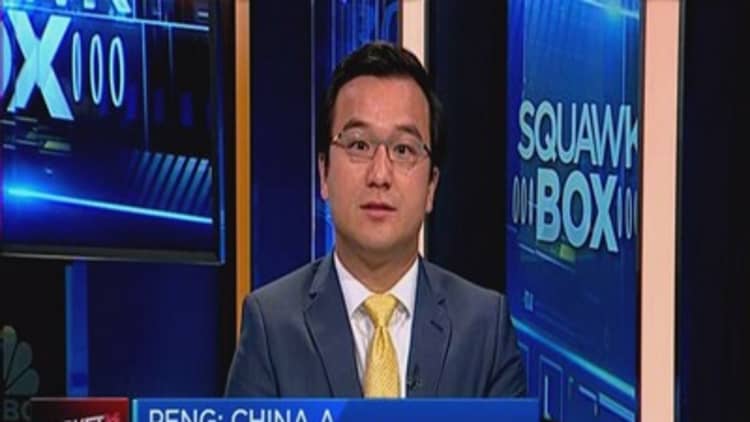A move over the weekend to allow Chinese pension funds to pump billions into flagging stock market failed to comfort investors, who sent Shanghai stocks crashing more than 8 percent on Monday.
On Sunday China gave pension funds managed by local governments the green light to invest in the stock market for the first time. Pension funds, which could previously only invest in bank deposits and treasuries, will now be able to invest up to 30 percent of their net assets in the country's stocks, equity funds and balanced funds.
Together the funds have assets of more than two trillion yuan ($322 billion) that can be invested, meaning about 600 billion yuan ($97 billion) could theoretically go into the stock market, according to state media.
Yet the benchmark Shanghai Composite Index plummeted 8.5 percent to 3,210.89 points on Monday as investors continued to flee the equity market, extending last week's deep losses. Stocks in China's main benchmark have now entirely erased their previously lofty gains for the year.
Policy action: What's next?
With the latest policy response failing to prop up sentiment, analysts say the government's next move will likely come in the form of fresh monetary stimulus – an interest rate and reserve requirement ratio (RRR) cut.
"Chinese pension funds going into the market is obviously good news, but it's not new news. It has been mentioned previously," Stephen Ma, head of greater China equities at BMO Global Asset Management, referring to the fact that the rule change had first been flagged in June.
"Over the long run, it will be great, because the Chinese stock market is dominated by retail investors. So bringing in more institutional market into the volatile market but it's for the medium, long run," he said.
Read More
But for now, the Chinese government needed to refocus its efforts on supporting the slackening economy through easing monetary policy, Ma said. This would have a positive knock-on effect on the stock market, he said.
"Real interest rates have been very high in China, they should focus on cutting interest rates or the RRR, that should improve consumption and corporate earnings," he said. The RRR is the level of cash reserves banks are required to hold; lowering the RRR frees up money that the banks can then lend.
The People's Bank of China (PBoC) has already cut its benchmark lending rate four times since November, last reducing it by 25 basis points to 4.85 percent at the end of June. So far, the rate cuts haven't proved effective in spurring economic activity.

Last week, a key early gauge of China's manufacturing sector – the Caixin flash manufacturing purchasing managers' index (PMI) - hit its lowest point since 2009 during the depths of the global financial crisis.
Nevertheless, analysts expect China will step on the monetary pedal soon.
"The intensified risk-off reinforces the China growth anxiety. We infer from last week's double-barrel PBoC liquidity injection that capital outflows are big and may persist. There is nothing on the horizon but another round of the PBoC easing that could stem capital outflows," said Prakash Sakpal, an economist at ING in Singapore
"We believe a 50-100bp RRR cut is imminent," he added.
All hope isn't lost
Despite the pervasive bearishness dogging the market, not all have lost hope on the Chinese authorities' ability to rescue the market from its swoon.
"A lot of people are extremely negative when I hear this, they think it's a sign that things are so out of control and there's nothing left for these guys to do," said Tim Seymour, managing partner at Triogem Asset Management, weighing in on China's decision to allow pension funds to invest in stocks. "I tend to be much more constructive when I hear policy responses like this."
"China has $4 trillion of reserves between their dollar reserve and Treasury holdings that they can paper over a lot of problems. They can push their pension funds much more aggressively than any other government in any part of the world," he said.
Separately, as concerns continue to mount over China's economic and financial stability, the International Monetary Fund (IMF) on Saturday sought to quell investor concerns, saying that the country's economic slowdown and a sharp fall in its stock market heralded not a crisis but a "necessary" adjustment for the world's second biggest economy.
"Monetary policies have been very expansive in recent years and an adjustment is necessary," Carlo Cottarelli, an IMF executive director representing countries such as Italy and Greece on its board, told a press conference. "It's totally premature to speak of a crisis in China."
- Reuters contributed to this report.



